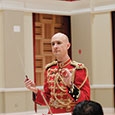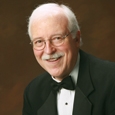Colonel Jason K. Fettig is the 28th Director of “The President’s Own” United States Marine Band. He joined in 1997 as a clarinetist and soon became a frequently featured soloist with both the band and the Marine Chamber Orchestra. After serving four years in the organization, he was selected as an Assistant Director. He became the band’s Executive Officer in 2004, and assumed leadership of the band in 2014.
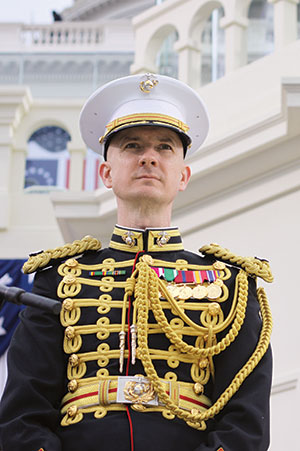
Photo by MSgt Kristin duBois
I played in bands and orchestras through school and college, although as a clarinetist my focus was decidedly on band. I always enjoyed my large ensemble experiences, maybe more than anything else, even more than playing as a soloist or as a chamber musician. That really informed my identity as a musician and made it all more appropriate that I would end up in the Marine Band some day.
When did you decide to seek a career in the military as a musician?
I actually hoped to be a pilot at one point and didn’t decide to major in music until my senior year in high school. It hit me suddenly that music was something I’ve always loved and could potentially be good at. Even at that point, I planned to become a music teacher. I was getting a music education degree at the University of Massachusetts and loved the idea of teaching. My transition into military music came a little bit accidentally.
The summer after my senior year of college I auditioned for the Marine Band, kind of on a whim. I certainly knew of the group’s reputation, but I didn’t know much more beyond that, including whether I was even remotely qualified to play in the organization. I almost did not take the audition. To my surprise, at the end of the audition process I was offered a position in the band, and I accepted it. I was initially unsure how I would take to this career choice and this environment, but within six months of joining, I realized I loved playing in this organization and loved being a United States Marine. That was going to be what I was going to do for the rest of my career.
When did you decide that you wanted to be a conductor?
Never in a million years would I have ever guessed that I would have the opportunity to be the director of the Marine Band and step into the same shoes that John Philip Sousa once wore. I did have aspirations to conduct early on, but when I won the Marine Band audition I thought I was going to be a professional clarinetist for the rest of my time. I had no idea that I would some day return to conducting in the Marine Band or that I would become the director.
Three years into my career in the band, another opportunity arose from within the organization to audition to be one of the assistant conductors. Because I had a little bit of experience and because of my experience of winning the Marine Band audition unexpectedly, I thought why not take the chance? Again, much to my surprise, I was offered that position, and that began the conducting part of my career with “The President’s Own.”
How does a day in the life of the Marine Band conductor look?
Because we are both a military and an arts organization, I fulfill the equivalent of the music director role, the executive director role, and the artistic director of the organization role, which is a lot of jobs to do each day. Luckily, I have an outstanding professional staff and a support system here that helps me manage it all, and of course, the amazing musicians who are capable of playing any music in any condition that might be required.
On the musical side, I split my days between studying the music that we are presently performing and various areas of our responsibilities, so there are lots of scores on my desk at all times. I also plan for future projects that I think will highlight the history and artistic importance of the band. That’s one part of my job on the musical side.
On the leadership side I work hard to take care of more than 150 people who are under my charge and to make sure all of the operational and logistical details of such a large and high-profile organization are taken care of each day. That part of the job takes a significant amount of time and effort. It is not something I trained to do in music school, but it is one of the most rewarding parts of my responsibilities. I consider preserving this institution and all of its history and providing for the health and happiness of those who helped define that institution to be a big part of my job each day.
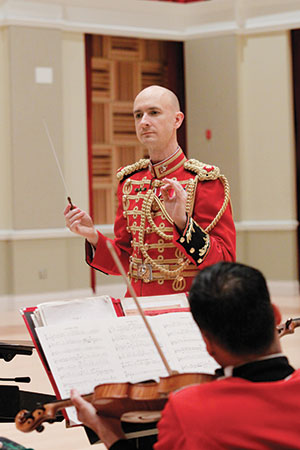
What does a day look like for a band member?
The performing band members have an erratic schedule. Such is the life of a military musician. We are a little bit like doctors in that we are always on call. Musicians spend a great deal of time practicing, considering the volume of music we play throughout the year. Then depending on what kind of performances we have, one week could be full of rehearsals and performances during regular hours. Another week might have a good portion of the day to practice and then have several nights in a row where they are performing either at the White House or in concert until midnight. Flexibility is essential for our musicians. Having the ability to do whatever is required at any time and often on short notice is a key part of our responsibilities.
What does it mean to be the music advisor to the White House?
Music has played an important role at the White House for centuries. The band first played at the White House in 1801. We have served every president since John Adams. Every event is different, and my job is to combine what the president and first lady want for the musical culture of the White House with the traditions that have developed over its history. These elements must be matched with the specific event that we are performing for. To do that I work closely with the social secretary, who organizes the shape of every event at the White House, and we work together on the musical style that should be represented. Sometimes we choose the specific music we will play. Otherwise, I handle that. Then, I go to work by making special arrangements if needed, choosing a program, and selecting the most appropriate ensemble for that program. My counsel is strictly in the area of providing the appropriate soundtrack to these important events each day at the White House.
Effective musicians and musical leaders know their audience and how to repackage a message so those who support music or attend performances can understand what we need. Making music is about building community, but music can only thrive if we build those community relationships first. It works this way in the military bands, and I would imagine it is the same in a school program, where you need to build a relationship with your administrators and help them understand the importance of what we do, so that administrators will offer more support. It’s our job in that role to facilitate that process.

As a clarinet player in the band previously, were there any special challenges in the transition to conductor?
There were a lot of challenges to that transition, not the least of which was moving from something that I thought I did pretty well, being a clarinetist, to conducting one of the best bands in the world, about which I was far less confident. It took time to feel good about what I had to offer and to feel like I was the right person to be providing that kind of leadership to these musicians. The other difficult part of the transition was going from being a colleague to my friends and fellow musicians to being a superior to the same people. Nothing can prepare you for that transition, but I was fortunate that the band members are so supportive of each other and so committed to our mission. They know that for us to succeed as an ensemble, we each need to succeed individually. It took several years for me to get comfortable with my new role, but the only way I was going to be able to do that was with the support of all of my colleagues.
What is the most rewarding aspect of your position?
As a musician, the best part of this job is conducting and working with these outstanding musicians. Not only can they do anything that I ask of them, they also want to do it. They care about what we do together and what we mean to each other, and that is an important aspect of music making.
I think the other part I love is the diversity of the experiences. I don’t just have the opportunity to be a professional musician; I also have a front-row seat to history. When we are mired in the daily work of being a musician, sometimes it takes an event, like the funeral of President George H.W. Bush, to remind you how powerful and important what we do is.
What is the most challenging aspect of your position?
Some of the things that are most enjoyable about the job – the diversity of the experiences and the many different things I have the opportunity to do – are also what make it challenging. There are some weeks and months that are just overwhelming given the sheer number of important events occurring – often at the exact same time. I have to say that pressure cooker has made me good at multitasking. It doesn’t get any easier, but it certainly gets a bit more manageable as you acquire those skills to shift from one thing to another. I haven’t screwed it up too badly yet.
What have you learned on the job that you didn’t learn in college?
My education in high school, college, and graduate school was invaluable, but after doing this job for more than 20 years, there is no substitute for experience. There are many things that I have learned simply by doing those things and sometimes making mistakes. That process can be difficult, embarrassing, and – if you’re not careful – self defeating. The theoretical aspects of conducting, performing, and leading do not always match up with reality. You can only learn how to do some things well by doing them. Many times in the Marine Band I have gone into a situation with a level of training, and that training got me off to a good start, but the ultimate experience was getting through the event and then banking away those thoughts and that process for the next time.
Talk about the interactive and theoretical young people’s concert series you initiated back in 2006.
The Marine Band has had educational programs for many years; these are an important part of our community service. The main programs, which we have done for years, are Music in the Schools and Music in the High Schools, for which we send chamber groups and sometimes larger groups out into the schools during school hours to perform for music students and answer questions about what we do and their musical development.
When I joined the conducting staff, I felt we were missing educational outreach for families – a regular concert experience that families could enjoy and learn from together. Every year during these programs we had a different theme, and we featured all of our ensembles from the band and chamber orchestra to the jazz band and jazz orchestra. We tried to diversify those themes from introducing instruments of the band to having a program about opera with the orchestra the next year with our talented singers, to the evolution of jazz. One year we played a show with tunes from Schoolhouse Rock!.
Every year I wanted these families to have a different experience. We found that by giving people chances to experience music outside of school, you saw the parents relive these musical experiences through their children. As a parent I can tell you there is nothing better than seeing my children light up when they are inspired by something. It is as much fun to experience things through children as I think it is to experience them yourself sometimes, and I wanted our programs to provide that opportunity. I found that the adults liked these concerts as much as the kids did, and sometimes the adults came without their children.
I authored and ran the concerts until 2015, and then they were taken over by our assistant director, Captain Ryan Nowlin, an incredibly gifted educator who spent ten years in the public school system in Ohio before he came to the Marine Band. He is still a successful composer and arranger, and he has brought that program to a whole new level.
What types of educational recordings and materials do you have online?
There are hundreds of Marine Band recordings online that are accessible to all. This includes nearly all of the Marine Band’s CDs. Those CDs still exist, but people can access the streaming audio through our YouTube channel. In addition to the audio recordings, we have many videos of performances by the band, chamber orchestra, and chamber ensembles. There is no substitute for listening and for watching a professional ensemble perform, to provide that ideal example of a high level of musicianship.
We have a couple other programs, too. We are about three quarters of the way done with a massive project to rerecord all 136 marches of John Philip Sousa. There are going to be seven albums, and we recently released album five. We hadn’t recorded all of these marches, since the 1970s. Not only did I want to rerecord these marches as an example of how they are played by the Marine Band, but it was also important to provide as many educational resources tied to the project as we could. In addition to the recordings, which are accessible to all, we also have produced full score and parts for each of these marches, and they can be downloaded for free. In some cases, these full scores are the first to be made. The parts are marked and edited to reflect exactly how the Marine Band plays these marches traditionally, which is modeled on the way Sousa played these marches, a style that often departs from the printed page and the published parts that we have all been using for decades. The goal with this project is to draw as much attention to John Philip Sousa’s music as possible and also to provide that resource to perform his works in a historically informed way.
You work with young musicians and remain dedicated to education initiatives. Why is that a priority for you?
Education is how we will continue to preserve our art. As a public institution dedicated to serving the community, being involved in education is one of the most important things the Marine Band can do. Our goal is to expand that resource for all who enjoy music, and especially for those who are studying music and need that mentorship and need those resources to take their education to the next level.
What are some of your favorite traditional works for band?
John Philip Sousa, of course! I didn’t know nearly as much about Sousa and his music before I came into the band as I do now, but I have an incredible appreciation for his music and the place it holds in our repertoire. I enjoy conducting Sousa’s music as much as anything. Everything you need to know about melodic expression, and phrasing, and harmony and style and variation of articulation can be learned through a Sousa march.
Even after all these years of conducting and playing, at this point, thousands of works, I still have a tremendous love and appreciation for the classic works in our canon. I always try to find opportunities among all of the contemporary music we do, and all the new music we do, to program pieces like Lincolnshire Posy, the Hindemith Symphony, and Holst’s Hammersmith, which was premiered by the Marine Band in 1932, as well as the music of Vincent Persichetti and William Schuman, for instance. Every time I return to those pieces I discover something new, and I really think that is the hallmark of an amazing and wonderful piece of music. The pieces that emerge in that way are the ones that will stay with us for hundreds of years to come.
I also love music that makes a band sound good. When the nature of the music, or the orchestration brings a band to its maximum capability of sound, it makes me feel good. I always look forward to conducting the music Bach. I think Bach performed by a band is incredible, especially his organ works. There are so many fugues, preludes, and organ works that can be orchestrated. There’s nothing quite like Bach played by a large band.
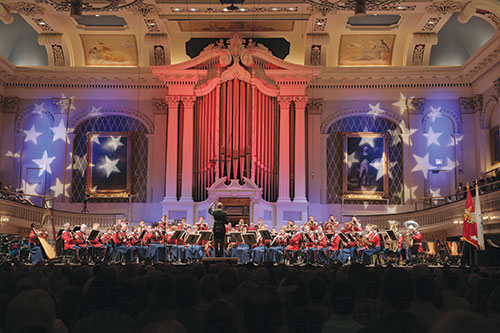
Photo by SSgt Rachel Ghadiali
Two of my most important musical influences were my high school band director, Dave Bresnahan, and my collegiate band director, Bill Rowell at the University of Massachusetts. Dave helped me to realize that I wanted to make music for a living. He was an incredibly gifted teacher and although he is retired now, he still does some teaching. The most striking aspect of his teaching was his tremendous passion for excellence, which you could not help but feel as a student of his. Equally important, he always put music in the context of real life. He showed his students what music means in our daily lives beyond the notes and beyond the execution as a student and playing your instrument. That is exactly the kind of influence that I believe that we are able to have today in the Marine Band, so those lessons were apropos for where I would eventually end up.
Bill held me to a high standard that put me on that path to winning a professional job. In addition, when I auditioned for the conducting position, I went back to Massachusetts and sought his advice about the process. He helped me to be confident to be my best in that stressful process.
What advice would you give students considering a career as a musician in the military?
Many of the people who audition for the band have trained as orchestral musicians because that is where the bulk of the professional jobs are outside of the military. Someone interested in pursuing a career in a military band should also listen to bands, play in bands, and learn the band repertoire.
In addition, remember that the simplest things are often the most elusive. Pay attention to detail in your work, and pursue excellence in your playing at every level. It is often the little things that separate good players from great players, and we are certainly looking for that in our audition processes as well.
It is important for people to diversify their experiences. I find that the best musicians, especially in a military band, are curious about their craft and are excited about all different kinds of music, not just classical music or jazz. This often shows in their playing. The musicians who have that innate curiosity to take on new experiences play in a way that can be inspiring, and this can set them apart from their peers.
What is your approach to learning a new score?
My experiences as a player have always informed my experiences and processes as a conductor. When I was a player, I naturally learned music macro to micro, getting a sense of the big picture and how something took shape as a whole before I got down into the details. I take the same approach as a conductor and in my score study. This serves several purposes. On a fundamental artistic level it helps me understand what the music is all about before I get too mired into the minutia, which can sometimes be distracting to the bigger message that a piece may convey, which I am responsible for realizing as a conductor.
On a practical level, this approach gives me maximum flexibility should I have limited study time. If I have a great deal of time to prepare, I can dig into a score to its deepest depths. Those are weeks and months that I thoroughly enjoy, but the reality is that there is not always this much time to prepare. If I take the approach of starting with the big picture and moving to the details, and my study time is cut short, I am still able to functionally lead the music. However, my study never stops until the actual performance.
What are the key ingredients of a successful rehearsal?
Preparation and pacing. On the preparation side, conductors must know the music better than their players and know what they want. Some days that is easier to do than others, but we all need to be as prepared as possible. That is the fundamental requirement for being the best teachers and conductors that we can be.
Second to preparation is the relationship between performers and conductor. I don’t think you could make good music if there is too much fatigue, tension, or pressure. A successful conductor always has a finger on the pulse of the ensemble and is a little bit of an armchair psychologist. Pay attention to how the musicians are feeling, take into account what is and is not working, and adjust the rehearsal accordingly. One size definitely does not fit all in the approach to each rehearsal. I approach each rehearsal as a new event and a new opportunity to let the musicians and climate dictate how we are going to rehearse any given piece of music.
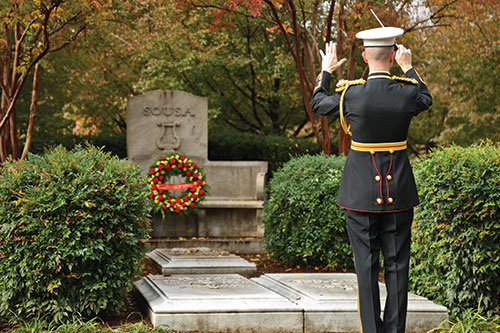
Photo by SSgt Brian Rust
What are you objectives when you step on the podium with a new or different ensemble?
I think the most important thing when musicians are getting to know each other is establishing trust. It is certainly important musician to musician, and it is equally important conductor to ensemble. Trust is one of the most difficult things to build, but when there is trust in each other, it inspires a freedom of playing that I think is essential to music making.
Trust relates to preparedness. Conductors will trust an ensemble if they feel like that ensemble is prepared and ready to work, and an ensemble will begin to trust conductors they feel are competent, prepared, and committed to what you’re about to do. After that, the trust is an ongoing process rooted in allowing each other to do your jobs. If I am conducting an ensemble and I trust the musicians to play, I am not going to overconduct or micromanage them. I will instead allow them to be artists, put their stamp on the performance, and collaborate and negotiate without frequent intervention by the conductor. When you empower the players to be part of that process and you trust them to do what they are trained to do, they enjoy what they are doing more, they appreciate the conductor’s work more, and the music is simply better.
In your opinion, what are the key responsibilities of a school music teacher?
I think the number one responsibility is to inspire. Teaching is certainly about helping a student understand the nuts and bolts of technical accomplishment, but that is not nearly as important as helping students develop a passion for what they do. Teachers who inspire, who make it a priority for students to feel good about what they are doing and feel like what they’re doing matters are the best teachers to me. I have been fortunate to have those teachers in my education, so I recognize this quality when I see it in other teachers.
The second responsibility is to instill a deep appreciation and pride for achieving excellence – to recognize where every student is developmentally, and then push them to be their better selves. When you combine those two elements of inspiring students and pushing them to always be better, you are preparing students for success in whatever they choose to do in life.
I would like to express gratitude to all of my colleagues in our profession who are mentoring that next generation of musicians. Those who choose to teach are doing the most important work for our art. Those of us who reap the benefits of that exceptional passion, work, and dedication are all grateful for teachers. Nothing gives me greater joy then when I have a chance to travel around the country and meet and work with all of these talented professionals.
